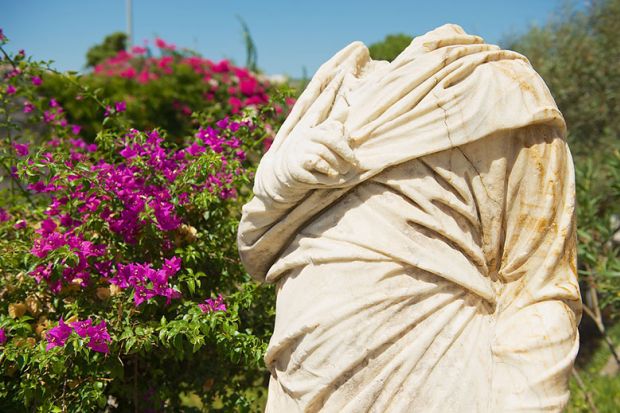Defenders and critics of academic disciplines share a central flaw: they typically fail to recognise and respect historical memory.
A case is point is Classics. As Paul Basken’s recent feature set out, the discipline is grappling with a perception that it is irrelevant and that its graduates are not employable. But this is just another chapter in the prolonged narrative about the supposed terminal decline of the humanities’ iconic discipline – and of the humanities more generally.
Basken reported a range of rhetorical and institutional responses, but, reading them, I had a deep sense of déjà vu.
So many of the responses in the article closely echoed conversations in the late 1960s and early 1970s. Those conversations varied from campus to campus and from one set of scholarly values to another. Defenders of the traditional Classics major and language training often talked past proponents of large elective classes on mythology, the roots of democracy or even ancient warfare. Sometimes these cross-listed offerings reflected new scholarly interests, such as women and gender or oral cultures. Any gains were piecemeal and limited.
Failure to attend to historical context and to exaggerate the novelty of their situations has debilitating consequences for disciplines. Ignorance or dismissiveness of continuities and repeated causes and effects limits their ability to understand their changing circumstances and to confront their challenges from strong foundations. It exaggerates the self-limiting circumstances of the present.
The lack of any references among Basken’s interlocutors to what has and has not worked in the past might be dismissed as the inevitable result of a younger generation of scholars replacing an older one. But I think not. It represents the neglect of the basic, even minimal recent historiography of the discipline. That was a part of my education in the 1970s.
On one extreme, an adjunct instructor at George Mason University advances a set of white supremacist myths about the uniqueness and superiority of the cradle of Western civilisation, whose achievements became models for what followed, and the badge of mental supremacy conferred by mastery of ancient Greek and Latin. None of this was ever true. Continuing research from comparative ancient history to cognitive psychology refutes all such ahistorical arguments.
Other classicists strive for greater relevance and responsiveness. But they too ignore their own relevant past. First, there is little recognition that the pressures that drive students, and the perceptions that influence them, are neither new nor always accurate. This ranges from parental advice and rising tuition to often misleading promotions of where the jobs are, or may be in the future.
Nor is the issue a simple matter of demand and supply economics. Despite their relevance to the strength of Classics, none of Basken’s commentators acknowledge the contradictory roles that universities’ own admissions policies have played in limiting the humanities and social sciences by over-admitting STEM and business applicants – often at the behest of self-interested employers, trustees and state governments.
STEM programmes often have too many students to serve them adequately. The arts and humanities lose students, budgets, faculty and other resources, while STEM complains that the background and auxiliary courses their students need have been cut. And unhappy STEM students lose the opportunity to be exposed to other fields that, evidence suggests, may interest them more. Only a historical and inclusive understanding can deal with this set of continuities and contradictions.
Classicists are not alone in their ahistorical floundering. As I have previously argued in Times Higher Education, historical sociologist and long-term administrator Nicholas Dirks also showed a surprising lack of historical awareness when he called, in THE in August, for the “two cultures” of science and the arts to finally be reconciled.
Dirks, a former chancellor of the University of California, Berkeley, wrote as if very little had changed since 1959, when scientist and novelist C. P. Snow’s anachronistic and long-disputed The Two Cultures and the Scientific Revolution appeared. It is true that, despite their slogans about interdisciplinarity, our institutions do not often foster collaboration. Yet plenty of it happens nonetheless; witness fields such as historical sociology and demography, historical archaeology and the digital and medical humanities.
Failure to recognise the range of advancement and the opportunities that already exist contradicts the very reconciliation efforts that Dirks and others seek to stimulate.
As for Classics, my own knowledge of its history suggests that, firstly, all classicists need to distinguish clearly between the goals of increasing majors versus expanding course enrolments. Second, they should reflect on the merits of pushing to maintain Greek and Latin language requirements versus joining other departments in multi- or interdisciplinary programmes. Such programmes range from comparative civilisations to questionable partnerships with cybersecurity.
You might have thought that Classics, of all disciplines, would appreciate the virtue of studying history. Only a reliable and active historical memory will allow this and other humanities disciplines to confront knowledgeably and responsibly their present and possible futures.
Harvey J. Graff is professor emeritus of English and history at Ohio State University. He is the author of many books on social history, including Undisciplining Knowledge: Interdisciplinarity in the Twentieth Century (Johns Hopkins University Press, 2015).
Register to continue
Why register?
- Registration is free and only takes a moment
- Once registered, you can read 3 articles a month
- Sign up for our newsletter
Subscribe
Or subscribe for unlimited access to:
- Unlimited access to news, views, insights & reviews
- Digital editions
- Digital access to THE’s university and college rankings analysis
Already registered or a current subscriber? Login







